NLSIU’s Academic Fellowship Programme – First Cohort (2022-24)
May 17, 2024
In December 2021, the National Law School of India University (NLSIU) launched the annual, two-year, full-time Academic Fellowship Programme. The fellowship is aimed at graduates and postgraduates from law, social sciences, humanities, and allied fields who are preparing to venture into practicing law or academic careers in law, public policy, or the social sciences.
About the First Cohort – April 2022 to March 2024
As part of the first cohort of the programme in 2022, nine candidates were selected with seven from law and two from the social sciences. During the course of this programme, they worked with faculty members on teaching assignments, policy interventions and research projects and forayed into diverse research and/or academic pathways. We asked some of them to share their experiences and reflect on how their respective career paths have developed during and after the programme.
 Aishwarya Birla: “In my role as an academic fellow, I worked closely with senior faculty across a range of programmes (on campus and distance education) in delivering teaching as well as in undertaking research. Through these opportunities, I transitioned into a focused research role as a research associate for the Pluralist Agreement and Constitution Transformation (PACT) project. I was with NLSIU in this capacity from 2023-2024. Over these two years I had the opportunity to work on a diverse range of projects, spanning both research and teaching, across fields of law. I continue to do so now as a member of faculty, as an Assistant Professor of law. This has been, and continues to be, a valuable opportunity for growth and learning in academia for me.”
Aishwarya Birla: “In my role as an academic fellow, I worked closely with senior faculty across a range of programmes (on campus and distance education) in delivering teaching as well as in undertaking research. Through these opportunities, I transitioned into a focused research role as a research associate for the Pluralist Agreement and Constitution Transformation (PACT) project. I was with NLSIU in this capacity from 2023-2024. Over these two years I had the opportunity to work on a diverse range of projects, spanning both research and teaching, across fields of law. I continue to do so now as a member of faculty, as an Assistant Professor of law. This has been, and continues to be, a valuable opportunity for growth and learning in academia for me.”
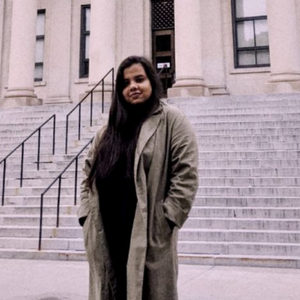 Anushka Sachan: “During my stint as an academic fellow at NLSIU, I focused on projects revolving around technology and IP law. The programme helped shape my understanding of the domains more holistically. This experience enabled me to seamlessly transition into my current role as a legal consultant for Modular Open Source Identity Platform (MOSIP) at the International Institute of Information Technology Bangalore (IIIT-B). The groundwork laid during the fellowship, exploring intricacies of technology and intellectual property law, now underpins my work; allowing me to provide valuable legal counsel to open source initiatives like MOSIP, and navigating their legal complexities.”
Anushka Sachan: “During my stint as an academic fellow at NLSIU, I focused on projects revolving around technology and IP law. The programme helped shape my understanding of the domains more holistically. This experience enabled me to seamlessly transition into my current role as a legal consultant for Modular Open Source Identity Platform (MOSIP) at the International Institute of Information Technology Bangalore (IIIT-B). The groundwork laid during the fellowship, exploring intricacies of technology and intellectual property law, now underpins my work; allowing me to provide valuable legal counsel to open source initiatives like MOSIP, and navigating their legal complexities.”
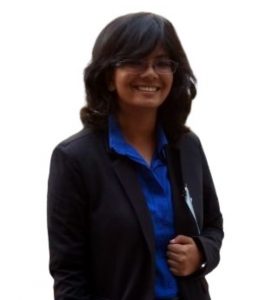 Ishika Saxena: “During the Academic Fellowship at NLSIU, I mainly worked on teaching assignments. I taught core courses in political theory for the B.A., LL.B. (Hons.) programme for three trimesters, co-taught an interdisciplinary course on Law and Social Sciences for the 3-Year LL.B. (Hons.) programme, and taught Transformative Constitutionalism for the Master’s Programme in Public Policy (MPP). In my final trimester, I offered an elective titled ‘Language and Power’. This exposure to teaching and getting to design syllabi has helped me nurture my strengths. Further, interacting with students has taught me a lot about mentorship and how to navigate being an academic mentor in formal and informal capacities. Taking this experience forward, I am currently working as a Guest Faculty at the Tata Institute of Social Sciences, teaching Western Political Thought to the undergraduate Political Science major students.”
Ishika Saxena: “During the Academic Fellowship at NLSIU, I mainly worked on teaching assignments. I taught core courses in political theory for the B.A., LL.B. (Hons.) programme for three trimesters, co-taught an interdisciplinary course on Law and Social Sciences for the 3-Year LL.B. (Hons.) programme, and taught Transformative Constitutionalism for the Master’s Programme in Public Policy (MPP). In my final trimester, I offered an elective titled ‘Language and Power’. This exposure to teaching and getting to design syllabi has helped me nurture my strengths. Further, interacting with students has taught me a lot about mentorship and how to navigate being an academic mentor in formal and informal capacities. Taking this experience forward, I am currently working as a Guest Faculty at the Tata Institute of Social Sciences, teaching Western Political Thought to the undergraduate Political Science major students.”
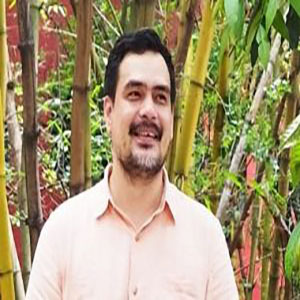 Manpreet Singh Dhillon: “This fellowship programme enabled a certain specialisation by providing me the opportunity to assist faculty in delivering courses in law and public policy. I have also had the opportunity to expand my appreciation of the connections between legal and social theory as a Teaching Assistant (TA) for the courses on Jurisprudence. The opportunity to work as a Teaching Assistant (TA) as part of the Master’s Programme in Public Policy (MPP) on ‘Rights, Duties, and Institutions’ has enabled me to pursue collaborative research on ‘Fourth Branch Institutions in India’. Co-teaching ‘Regulatory Governance’ has given me further impetus to continue research and teaching in the regulation and governance of emerging technologies in the Indian context. As part of the MPP programme, I have designed and delivered dissertation seminars on ‘Health’ and ‘Technology, Policy, and Society’. As an early career scholar, I have been able to exchange ideas with exceptional academics, present my research within and outside the university, comment on my peer’s research, and work as an associate editor for the National Law School Journal. These experiences have provided me with much-needed training in the production and dissemination of scholarly knowledge in law and social sciences from the perspective of the Global South. I have been able to transition to my new role as an Assistant Professor with the Master’s Programme in Public Policy (MPP) at NLSIU. Going forward, I will continue to teach, research, and publish at the interface of law, technology, and society.”
Manpreet Singh Dhillon: “This fellowship programme enabled a certain specialisation by providing me the opportunity to assist faculty in delivering courses in law and public policy. I have also had the opportunity to expand my appreciation of the connections between legal and social theory as a Teaching Assistant (TA) for the courses on Jurisprudence. The opportunity to work as a Teaching Assistant (TA) as part of the Master’s Programme in Public Policy (MPP) on ‘Rights, Duties, and Institutions’ has enabled me to pursue collaborative research on ‘Fourth Branch Institutions in India’. Co-teaching ‘Regulatory Governance’ has given me further impetus to continue research and teaching in the regulation and governance of emerging technologies in the Indian context. As part of the MPP programme, I have designed and delivered dissertation seminars on ‘Health’ and ‘Technology, Policy, and Society’. As an early career scholar, I have been able to exchange ideas with exceptional academics, present my research within and outside the university, comment on my peer’s research, and work as an associate editor for the National Law School Journal. These experiences have provided me with much-needed training in the production and dissemination of scholarly knowledge in law and social sciences from the perspective of the Global South. I have been able to transition to my new role as an Assistant Professor with the Master’s Programme in Public Policy (MPP) at NLSIU. Going forward, I will continue to teach, research, and publish at the interface of law, technology, and society.”
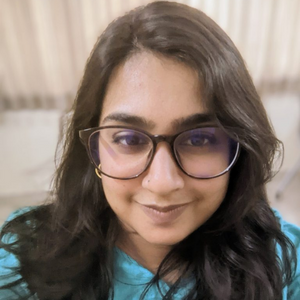 Nishtha Sinha: “My experience as an Academic Fellow was nothing short of transformational for my career. I came to NLS in 2022, having worked in myriad roles and spaces – as a judicial clerk, an advocate and a policy researcher. Yet, I was still looking for a path to help me streamline my research interests and professional skills. I found exactly that at NLSIU, with an unmatched opportunity to work with senior faculty members and an extremely supportive cohort of academic fellows. From classroom teaching to program development, and from training public officials to building diploma courses, the Fellowship provided a flavour of all NLS had on offer. In covering the breadth of activities academia required of me, I found the path that I knew I would strive to be a part of, for years to come. Inspired by my experiences, I have chosen to study the LLM program in Environment Law and Policy from Stanford University, with the hope of contributing to research around some of the most pressing climate issues of our time.”
Nishtha Sinha: “My experience as an Academic Fellow was nothing short of transformational for my career. I came to NLS in 2022, having worked in myriad roles and spaces – as a judicial clerk, an advocate and a policy researcher. Yet, I was still looking for a path to help me streamline my research interests and professional skills. I found exactly that at NLSIU, with an unmatched opportunity to work with senior faculty members and an extremely supportive cohort of academic fellows. From classroom teaching to program development, and from training public officials to building diploma courses, the Fellowship provided a flavour of all NLS had on offer. In covering the breadth of activities academia required of me, I found the path that I knew I would strive to be a part of, for years to come. Inspired by my experiences, I have chosen to study the LLM program in Environment Law and Policy from Stanford University, with the hope of contributing to research around some of the most pressing climate issues of our time.”
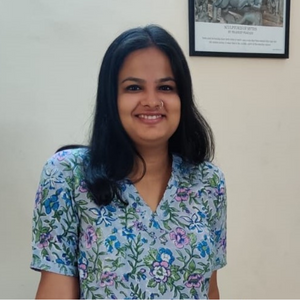 Pawani Mathur had applied for NLSIU’s academic fellowship because of the unique mix of teaching and research assignments that are designed for early career academics in India. During her stint as an academic fellow, she co-taught the course ‘Code of Civil Procedure (CPC)’, worked with the Centre for Child and the Law (CCL) where she briefly carried out research on the the National Food Security Act 2013, and she also worked as a part of the research project ‘Issues in Pre-Trial Processes in India‘ led by Prof. Mrinal Satish. Her areas of interest are Criminal law, Legal Methods and Constitutional Law. She is currently a PhD researcher at the University of Sydney.
Pawani Mathur had applied for NLSIU’s academic fellowship because of the unique mix of teaching and research assignments that are designed for early career academics in India. During her stint as an academic fellow, she co-taught the course ‘Code of Civil Procedure (CPC)’, worked with the Centre for Child and the Law (CCL) where she briefly carried out research on the the National Food Security Act 2013, and she also worked as a part of the research project ‘Issues in Pre-Trial Processes in India‘ led by Prof. Mrinal Satish. Her areas of interest are Criminal law, Legal Methods and Constitutional Law. She is currently a PhD researcher at the University of Sydney.
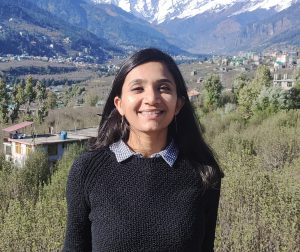 Radhika Nair: “Since completing my LLM in Human Rights Law from Leiden University in 2021 and having worked as a lawyer for three years before that, I had been looking for an opportunity to make a transition to academia. Being a part of the first cohort of Academic Fellows at NLSIU was a useful learning experience as I understood the demands and challenges of academic work life. After having completed two years of this fellowship with its engaging mix of research and teaching roles in different areas of the law, I am confident about taking the next step to pursue my doctoral studies and apply for teaching positions.”
Radhika Nair: “Since completing my LLM in Human Rights Law from Leiden University in 2021 and having worked as a lawyer for three years before that, I had been looking for an opportunity to make a transition to academia. Being a part of the first cohort of Academic Fellows at NLSIU was a useful learning experience as I understood the demands and challenges of academic work life. After having completed two years of this fellowship with its engaging mix of research and teaching roles in different areas of the law, I am confident about taking the next step to pursue my doctoral studies and apply for teaching positions.”
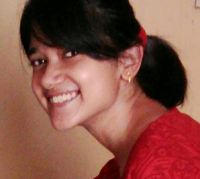 Sebanti Chatterjee: “I am currently an Assistant Professor, Liberal Arts at SRM University, in Andhra Pradesh. The Academic Fellowship programme at NLSIU was an enriching experience for me. I had an excellent and dynamic cohort and got acquainted with some wonderful colleagues and students. I was able to dedicate time to finish my monograph and ruminate on new research ideas for future collaborations. I really enjoyed taking the Master’s in Public Policy Programme (MPP) seminar course which was a student-led course. I got opportunities to teach Sociology in the capacity of a co-teacher. These assignments taught me the importance of being in sync and preparing lesson discussions in advance. I also enjoyed my editorial experience with the NLSIU journal.”
Sebanti Chatterjee: “I am currently an Assistant Professor, Liberal Arts at SRM University, in Andhra Pradesh. The Academic Fellowship programme at NLSIU was an enriching experience for me. I had an excellent and dynamic cohort and got acquainted with some wonderful colleagues and students. I was able to dedicate time to finish my monograph and ruminate on new research ideas for future collaborations. I really enjoyed taking the Master’s in Public Policy Programme (MPP) seminar course which was a student-led course. I got opportunities to teach Sociology in the capacity of a co-teacher. These assignments taught me the importance of being in sync and preparing lesson discussions in advance. I also enjoyed my editorial experience with the NLSIU journal.”
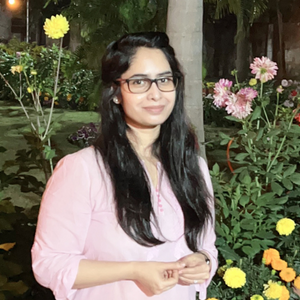 Sheetal Shinde: “My experience as an Academic Fellow at NLSIU is a significant learning milestone in my career. During this period, I was engaged in large-scale end-to-end research projects in the areas of child rights at the Centre for the Child and the Law (CCL) and environmental issues and human rights at the Centre for Environment Law, Education, Research and Advocacy (CEERA), which helped me gain useful insights into data collection, analysis, and drafting policy suggestions. The research experience has helped me proceed with my doctoral research in child rights. My experience in preparing the course curriculum and course material for the department of Professional and Continuing Education (PACE) will definitely benefit me in the future.”
Sheetal Shinde: “My experience as an Academic Fellow at NLSIU is a significant learning milestone in my career. During this period, I was engaged in large-scale end-to-end research projects in the areas of child rights at the Centre for the Child and the Law (CCL) and environmental issues and human rights at the Centre for Environment Law, Education, Research and Advocacy (CEERA), which helped me gain useful insights into data collection, analysis, and drafting policy suggestions. The research experience has helped me proceed with my doctoral research in child rights. My experience in preparing the course curriculum and course material for the department of Professional and Continuing Education (PACE) will definitely benefit me in the future.”
The University is currently recruiting its third cohort of Academic Fellows, a testament to the continued demand and effectiveness of the programme. Former fellows have moved on to pursue various paths, including enrollment in PhD programmes, securing full-time teaching positions, or transitioning into industry roles. This demonstrates the programme’s success in nurturing academic talent and cultivating versatile skill sets that span research, teaching, and technical domains. The tangible achievements of past fellows highlight the programme’s pivotal role in fostering both professional growth and academic excellence, further solidifying its standing as a cornerstone of the University’s dedication to research and scholarly achievement.
More about the Academic Fellowship Programme at NLSIU
The Academic FellowshipProgramme/Programme offers academic fellows the opportunity to work closely with the best law and social sciences faculty and receive guidance and mentorship on research proposals, research writing, problem solving and critical thinking skills. This gives them an inside view of the pedagogical processes in both online and offline education at NLSIU. Academic Fellows are also expected and encouraged to conduct and pursue research/writing of their own. The university recruits candidates with a wide range of academic and intellectual interests which are also in line with the focus of NLSIU’s research projects and centres.
Academic Fellows work under the aegis of the Office of the Dean of Research, contributing to diverse research endeavors conducted by faculty members, research centers, and endowed chairs within the university. Several of these centers engage in outreach programmes that bridge academic insights with community initiatives. Academic Fellows closely engage with these research initiatives and also collaborate with the Dean of Academics and Programme Chairs to support the teaching and learning programmes at the University. A faculty member who oversees the programme’s coordination, also hosts bi-weekly seminar series. This platform offers fellows the opportunity to present their research findings and written work, fostering academic dialogue and intellectual exchange within the cohort. Their responsibilities also include working with the University’s Writing Center, organizing training sessions and conferences, and other related activities.
Future advertisements for the Academic Fellowship Programme will be published under the Work with Us page.

